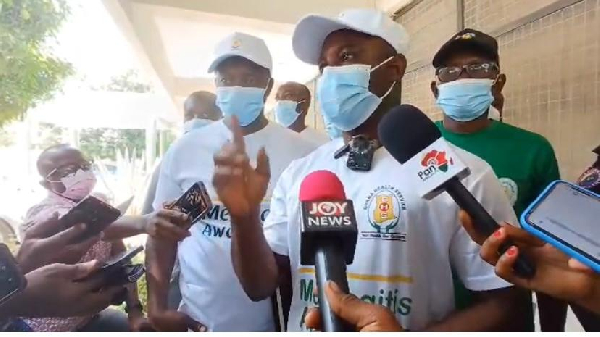 Health Minister Kwabena Mintah Akandoh interacting with the media at Wa
Health Minister Kwabena Mintah Akandoh interacting with the media at Wa
The Minister of Health, Kwabena Mintah Akandoh, and the Acting Director-General of the Ghana Health Service, Prof. Samuel Kaba Akoriyea, have arrived in Wa, in the Upper West Region, to provide high-level support in the fight against meningitis.
During the visit, they will engage key stakeholders, including the Regional Minister and the Wa Naa (Overlord of the Wa Traditional Area).
The minister will also visit the Nadowli Kaleo District to interact with the District Coordinating Director.
He is scheduled to tour the district hospital, where meningitis cases are being managed, and interact with staff, and as well hand over essential medicines to support the case management.
Speaking to the media on February 12, 2025, at Wa, Akandoh stated, “I am excited about the enthusiasm of the health professionals on the ground. I think that if we encourage them, they will do a better job. Sometimes, in situations like this, by the time you get to the ground, the health professionals are already exhausted. But I’m happy about their energy and enthusiasm.”
This visit aims to ensure a firsthand assessment of the situation, enhance response strategies and strengthen efforts to curb the spread of meningitis in the region.
As of Sunday, February 9, 2025, a total of 23 suspected meningitis cases with four deaths had been reported in the Upper West Region.
Three districts: Nadowli, Nandom, and Jirapa, were already in an alert phase during the week.
Additionally, Wa West and Sissala East reported new cases, bringing the total number of affected districts to eight (8).
Meningitis is a severe infection of the membranes covering the brain and spinal cord, posing a significant global public health challenge. It is most common during the dry season in high-risk areas, such as northern Ghana.
Cerebrospinal Meningitis (CSM) remains a major public health concern in Ghana, with a mortality rate of up to 10% among confirmed cases annually.
The northern regions fall within the meningitis belt, making them particularly vulnerable to outbreaks.
Health authorities are urging the general public to seek early medical attention if they experience symptoms, as early treatment significantly improves survival rates.
